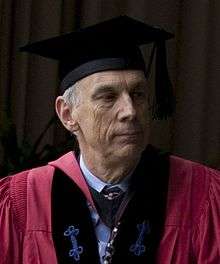Robert Keohane
| Robert Keohane | |
|---|---|
 Keohane at Shimer College in 2012. | |
| Born |
October 3, 1941 Chicago, Illinois, U.S. |
| Nationality | American |
| Fields | Political science |
| Institutions |
Princeton University Duke University |
| Alma mater |
Harvard University Shimer College |
| Doctoral advisor | Stanley Hoffmann |
| Known for | After Hegemony, "International Institutions: Two Approaches" |
| Influences | Kenneth Waltz |
| Spouse | Nannerl O. Keohane |
Robert Owen Keohane (/ˌkiːoʊˈhɑːn/; born October 3, 1941) is an American academic, who, following the publication of his influential book After Hegemony (1984), became widely associated with the theory of neoliberal institutionalism in international relations. He is currently a Professor of Political Science at the Woodrow Wilson School at Princeton University.[1] A 2011 survey of International Relations scholars placed Keohane second in terms of influence and quality of scholarship in the last twenty years.[2]
Early life
Keohane was born at the University of Chicago Hospitals. His education through the fifth grade was at the University of Chicago Laboratory Schools. When he was 10, the family moved to Mount Carroll, Illinois, where he attended public school and his parents taught at Shimer College. After the 10th grade, Keohane enrolled at Shimer through the school's early entrance program, which since 1950 has allowed selected high school students to enter college before completing high school.[3] When later asked to compare his undergraduate education as an early entrant at Shimer with his graduate work at Harvard, Keohane remarked "it is not clear to me that I have ever been with a brighter set of people than those early entrants."[4] Keohane currently serves on the Board of Trustees of Shimer College.
He earned a BA, with honors, from Shimer College in 1961.[4] He obtained his PhD from Harvard in 1966, one year after he joined the faculty of Swarthmore College. He was the student of Harvard University Professor Stanley Hoffmann.
Career
Keohane has taught at Swarthmore, Stanford, Brandeis, Harvard, and Duke. At Harvard he was Stanfield Professor of International Peace, and at Duke he was the James B. Duke Professor of Political Science.
He is the author of many works, including After Hegemony: Cooperation and Discord in the World Political Economy (Princeton University Press, 1984), for which he was awarded the second annual University of Louisville Grawemeyer Award in 1989 for "Ideas Improving World Order".[5]
Between 1974 and 1980 he was editor of the journal International Organization. He has been president of the International Studies Association, 1988–89, and of the American Political Science Association, 1999-2000.
Keohane is a fellow of the American Academy of Arts and Sciences, the American Academy of Political and Social Science and has held a Guggenheim Fellowship and fellowships at the Center for Advanced Study in the Behavioral Sciences and the National Humanities Center. He was awarded the Johan Skytte Prize in Political Science in 2005, and elected to the National Academy of Sciences that same year. He was listed as the most influential scholar of international relations in a 2005 Foreign Policy poll.[6]
Political scientists he has taught include Lisa Martin, Andrew Moravcsik, Layna Mosley, Beth Simmons, Ronald Mitchell, and Helen V. Milner. Other students include Fareed Zakaria.[7]
In 2012, Keohane received the Harvard Centennial Medal.[7]
In fall 2013 he is the Allianz Distinguished Visitor at the American Academy in Berlin.
In 2014, he was awarded the James Madison Award of the American Political Science Association.[8]
Keohane is married to Nannerl O. Keohane, former president of Duke and herself a noted political scientist.[1][9] They have four grown children: Sarah, Stephan, Jonathan, and Nathaniel.
Books
- After Hegemony: Cooperation and Discord in the World Political Economy (Princeton University Press, 1984)
- Neorealism and Its Critics (Columbia University Press, 1986)
- International Institutions and State Power: Essays in International Relations Theory (Westview, 1989)
- Power and Interdependence: World Politics in Transition (Little, Brown, 1977); with Joseph S. Nye, Jr.
- Designing Social Inquiry: Scientific Inference in Qualitative Research (Princeton, 1994); with Gary King and Sidney Verba
- Power and Interdependence in a Partially Globalized World (Routledge, New York, 2002)
- Humanitarian Intervention: Ethical, Legal, and Political Dilemmas (Cambridge University Press, 2003); with J. L. Holzgrefe
- The Regime Complex for Climate Change with David G. Victor (2010)[10][11]
References
- 1 2 Sharon Walsh and Jeffrey Brainard, 'Duke's Ex-President and Her Husband Head to Princeton; Penn's Medical School Denies Tenure to 2 Bioethicists', in The Chronicle of Higher Education, October 29, 2004
- ↑ "TRIP AROUND THE WORLD: Teaching, Research, and Policy Views of International Relations Faculty in 20 Countries" (PDF).
- ↑ Shimer College. "Early Entrance Program". Retrieved 2012-04-08.
- 1 2 Shimer College. "Alumni Profiles: Robert Keohane". Shimer.edu. Retrieved 2012-04-08.
- ↑ "1989- Robert Keohane".
- ↑ "Coming Soon". Foreign Policy. Retrieved 2011-09-19.
- 1 2 "Harvard Graduate School Honors Daniel Aaron, Nancy Hopkins, and Others". Harvard Magazine. 2012-05-23. Retrieved 2012-05-29.
- ↑ https://www.princeton.edu/main/news/archive/S41/05/31E94/index.xml?section=facstaff
- ↑ Charlick, Hannah (October 15, 2004). "Keohanes to join Wilson School faculty". The Daily Princetonian.
- ↑ "The Regime Complex for Climate Change by David Victor, Robert Keohane :: SSRN". Papers.ssrn.com. Retrieved 2011-09-19.
- ↑ "The Regime Complex for Climate Change - Harvard - Belfer Center for Science and International Affairs". Belfercenter.ksg.harvard.edu. Retrieved 2011-09-19.
External links
- Robert Keohane's Faculty Profile at Princeton
- Interview with Robert Keohane by Theory Talks (May 2008)
- Robert O. Keohane as the Allianz Distinguished Visitor at the American Academy in Berlin